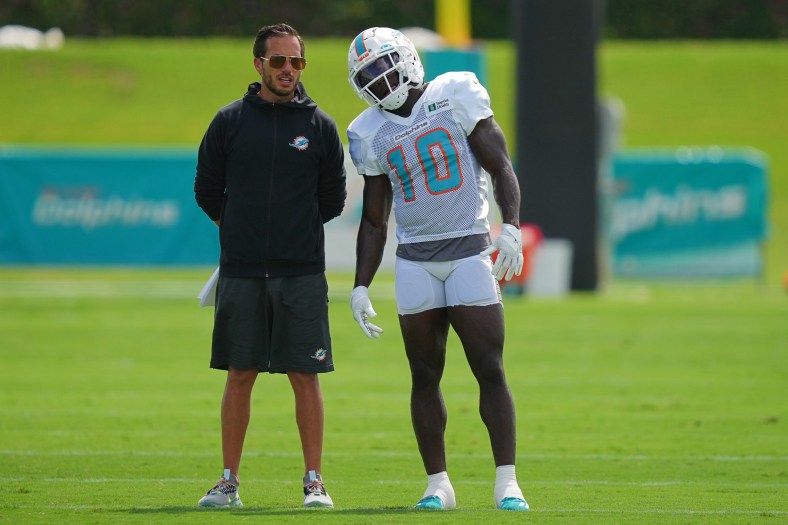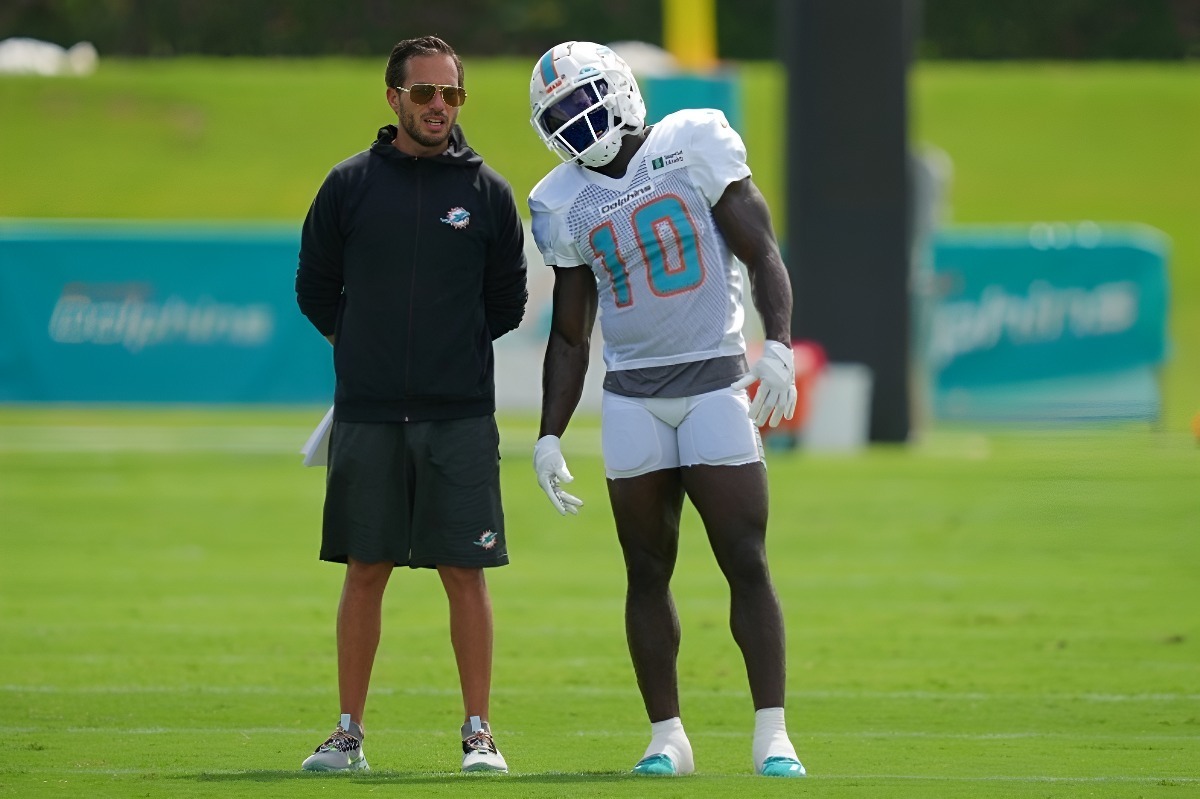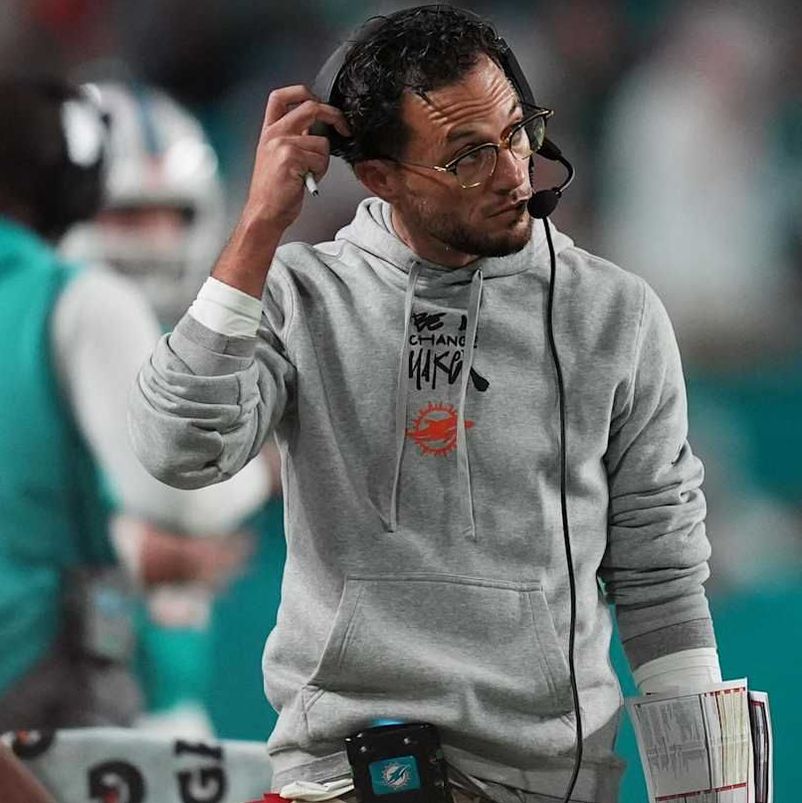
Extending Tyreek Hill’s contract would be a win-win for the Dolphins organization and the future Hall of Fame receiver
Tyreek Hill is one of the marquee faces of the NFL.
He’s been one of the most dangerous weapons in the league since the 2017 season, and has taken his game to another level in Miami, producing 3,509 receiving yards and 21 touchdowns the past two seasons.
If Hill stays on his present pace of producing 1,000-yards seasons for the next three or so years, he’ll seemingly be a lock for the Pro Football Hall of Fame and might gain first-ballot entry into the sport’s collection of legends.
That’s the caliber of talent the Miami Dolphins have on their roster, and the team’s decision-makers need to make sure it stays that way, with Hill continuing to serve as the focal point for Mike McDaniel’s offense.
The best way to do that is to extend the Cheetah’s contract, which is something Hill and his camp will be highly in favor of, especially considering the guaranteed money in his current deal concludes at the end of this season.
It would be wise for the franchise to do an extension with Hill now, within the next three weeks, for many reasons.
Why Hill needs an extension now
Hill, who signed a four-year, $120 million contract extension when Miami acquired him from Kansas City two offseasons ago, already is the highest-paid receiver in the NFL.
But while his contract averages $30 million a season, he’s really pulling in $24 million because Hill likely will never see his $45 million payday that’s slotted for the 2026 season. That balloon payment is only in the deal to artificially inflate his average salary. But the Dolphins have no intentions of paying Hill that, and he and his agent Drew Rosenhaus know it.
Hill is slated to earn $20.5 million this season in base salary and bonuses, and carries a $31.3 million cap hit. The cap-strapped Dolphins, who need to clear another $37 million by March 13, would be wise to extend Hill’s deal a season or two, potentially bumping up his present pay rate by $1-2 million annually, and that type of extension would drastically lower his cap hit while securing his services past this season.
A restructured contract creates more of a mess
Restructuring Hill’s contract by turning base salary into a roster bonus would further complicate Miami’s cap issues, not now, but in coming seasons because Hill’s cap charge already is $34.2 million in 2025, and $56.3 million in 2026.
Restructuring his existing deal for the second time would escalate both those figures, pushing the credit card debt down some more. But adding years to the deal would deflate the cap charge significantly.
If the Dolphins added two years to Hill’s deal, and bumped up salary another $2 million a season (paying him $26 million annually instead of $24 million, in real money) the cap charge would drop from $31 million to $17 million if he’s given a $20 million signing bonus. And the charge would be reduced in each of the following two seasons as well.
Big receiver deals coming
The Dolphins would benefit from extending Hill now because that $14 million cap savings is the easiest way to lower the $37 million cap deficit, outside of signing Tua Tagovailoa and Christian Wilkins to multi-year deals. Everything else — like restructuring Jalen Ramsey, Bradley Chubb or Terron Armstead’s deals — has massive consequences to it.
Also, Minnesota Vikings receiver Justin Jefferson and Cincinnati Bengals receiver Ja’Marr Chase each will be lobbying for contract extensions this offseason from their teams, and those are two receivers who could drive up Hill’s asking price since they’ll each likely demand to become the NFL’s highest-paid receiver.
If Miami waits to extend Hill, the price could be significantly higher once Jefferson or Chase get their extensions and avoid the fifth-year options presently on the horizon.
The only downside of extending Hill’s deal is gambling on whether he’ll still be worth $24-26 million a season in 2024, 2025 and 2026, which is when the guaranteed money in a new deal would exist. But it’s hard to envision a player who was on pace to produce 2,000 receiving yards before suffering a troublesome ankle injury in the season’s final month falling off drastically, even though he’ll turn 30 on Friday.
He hasn’t shown any signs of slowing down the past two seasons, and at this point the Dolphins franchise should be more worried about what Miami’s offense would look like without Hill than what an aging Hill will perform like.
That’s why Hill is the wisest, and if not the safest player to turn to when it comes time for the Dolphins to create cap space for this offseason’s roster renovations.




